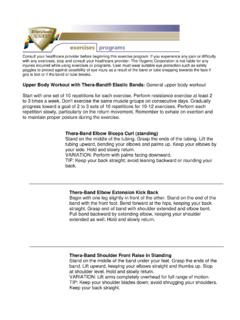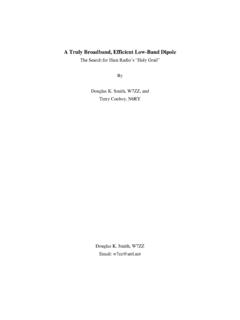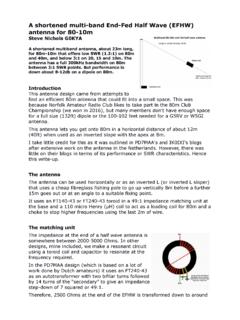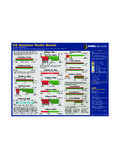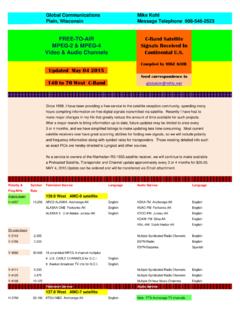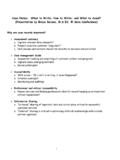Transcription of Low Band Antennas at W3LPL - K3LR
1 Low band Antennas at W3 LPL High Performance Transmitting and Receiving Antennas for 160, 80 and 40 meter DXing and Contesting Lessons Learned from More than Fifty Years of Continuous Improvement High Performance 40 Meter Transmitting Antennas High horizontally polarized dipole at least 70-100 feet high easily provides 6 dB of ground gain for free! 4-Square array of phased 33 foot verticals with 30-60 radials good performance if high horizontal Yagis and quads aren t feasible at least 50-70 feet away from all nearby towers and Antennas Shorty 40 2 element Yagi or Moxon Rectangle 70-100 feet high 3 element Yagi or 4 element OWA Yagi 100-140 feet high Stacked 2 element shorty 40 Yagis or Moxon Rectangles lower Yagi 70-75 feet high upper Yagi 140-150 feet high Stacked 3 element Yagis or 4 element OWA Yagis lower Yagi 100-120 feet high upper Yagi 190-200 feet high High horizontally polarized Antennas almost always provide better 40 meter DX performance than any vertically polarized antenna 02468101214161820-20-18-16-14-12-10-8-6- 4-20 Stacked 3 Element 40 Meter Yagis 48 Foot Booms 100 Feet and 200 Feet High decibels BOTH 200 ft 100 ft Europe 23 7 Asia VK/ZL 15 5 elevation angle in degrees First
2 Known 40 Meter Rotatable Yagi 2 Element Full Size Yagi at 60 Feet Constructed by W9LM in 1950 Shortly after testing his new 40 meter Yagi, W9LM removed all of his 40 meter phased verticals The First (near) Full Size 3 Element 40 Meter Yagi in 1955 Telrex 3 element Yagis transformed 40 meter DXing in the 1950s W0 MLY W1FZ K2 DGT K2GL K2 LWR WA2 SFP(W2PV) W8 FGX W8 VSK W9 EWC W3 KRQ s Homebrew Full Size 3 Element 40 Meter Yagi in 1959 Contesters and DXers built many excellent 3 element Yagis W3 GRF W3 KRQ W3 MSK (W3AU) W8 JIN and others Cushcraft XM-240 2 Element 40 Meter Yagi One of the most popular Shorty Forty Yagis 40 Meter Moxon Rectangle VSWR less than :1 from MHz 22 foot boom and 48 foot elements Stacked Moxons on a 140 foot tower are fully competitive with a more expensive full size 3 element Yagi Stacked 40 Meter 4 element OWA Yagis at K9CT The Array Solutions Stack Match A Stackmatch significantly improves the capabilities of any stacked Yagi array The Comtek 4-Square Controller High Performance 80 Meter Transmitting Antennas 65 foot vertical with 30-60 shallow buried 65 foot radials good performance if a high dipole isn t feasible High horizontally polarized dipole at least 70-100 feet high easily provides 6 dB of ground gain for free!
3 Horizontally polarized 2 or 3 element Yagi, 2 element quad or Moxon Rectangle at least 140 feet high 4-Square array of phased 65 foot verticals excellent performance as an alternative to horizontal quads or Yagis at least 30-60 shallow buried 65 foot radials under each vertical at least 70-140 feet away from all nearby towers and Antennas High horizontally polarized Antennas almost always provide better 80 meter DX performance than simple vertically polarized Antennas K3ZO Installed this 3 Element 80 Meter Yagi at 140 Feet in 1984 K3ZO s very successful horizontally polarized 3 element Yagi changed my thinking about 80 meter Antennas for DX 80 Meter Wire Moxon Rectangle at 140 feet at W3 LPL Broad VSWR bandwidth from MHz 102 feet x 37 feet 80 Meter Transmitting antenna Layout at W3 LPL NE SSE SSW NW Quad @ 170 ft Quad @ 140 ft Quad @ 170 ft Moxon @ 140 ft West Quad @ 170 ft High
4 Performance 160 Meter Transmitting Antennas The 125 foot vertical: the 160 meter gold standard at least 30-60 shallow buried 120 foot radials 4-square arrays of phased 125 foot verticals very high performance for both transmitting and receiving at least 30-60 shallow buried 120 foot radials for each vertical Tall towers and Antennas will significantly degrade the performance of nearby vertical Antennas at least 125-250 feet away from all nearby towers and Antennas significant antenna pattern degradation increased ground losses tower detuning is possible but it s a complex task Horizontally polarized transmitting Antennas are almost always a poor choice for 160 meter DX Cage T-Vertical Used by 1 BCG in the Successful 1921 Trans-Atlantic Tests By far the strongest North American signal heard in Europe during the Trans-Atlantic Tests High Performance Low band Receiving Antennas Beverages and Phased
5 Arrays of Short Verticals Much better directivity than most transmitting Antennas much lower cost instant azimuth selection greatly reduced footprint and greatly reduced height (7 to 25 feet) superb QRM, QRN and RFI suppression on as little as 3/4 acre in- band receiving capabilities for multi-op and SO2R stations greatly reduced mutual coupling between individual verticals greatly reduced need for high efficiency matching and radial systems Beverages Arrays of Beverages Arrays of short passive verticals Arrays of short active verticals All receiving antenna dimensions in this presentation are for 160 meters - simply scale them to 80 or 40 meters Single Wire Beverage a very simple and inexpensive antenna 250 - 400 feet long 4 - 6 dB RDF 100 degree beamwidth 500 - 600 feet long 10 dB RDF 70 degree beamwidth Single Wire Beverage The simplest and most reliable high performance receiving antenna 250 - 400 feet long 4 - 6 dB RDF 100 degree beam width 500 - 700 feet long 10 -11
6 DB RDF 70 degree beam width 800 - 900 feet long 12 dB RDF 60 degree beam width 1300 Foot Beverage Installed by 2ZE Paul Godley at Androssen, Scotland during the Successful 1921 Trans-Atlantic Tests Beverages were all but forgotten by hams for 45 years until K1 PBW re-introduced them to 160 meter DXers in 1967 160 Meter Radiation Pattern of a Simple 600 Foot Beverage Two Wire Bidirectional Beverage Switchable in two directions with one feed line A deep rear null can be steered if both feed lines feed a variable phase combiner Close Spaced Staggered Beverage Arrays Two or three close spaced, staggered 500-600 foot Beverages Enhanced front-to-back ratio compared to a single Beverage A deep rear null can be steered if both feed lines feed a variable phase combiner 11 dB RDF on one acre Broadside Pair of Staggered Beverages Four 800-900 foot Beverages, 330 foot broad side spacing 45 degree 3 dB beamwidth 14 dB RDF on 8 acres Phased Low Impedance Verticals 25 Foot Passive Umbrella Verticals Short radials are required at the base of each vertical eight 70 foot radials, sixteen 35 foot radials or chicken wire randomly laid on the ground or shallow buried, symmetry is not important Four 25 foot umbrella wires attached to the top of each vertical reduces antenna height and improves array bandwidth if necessary, use 35 foot verticals with no umbrella wires As little a 65 foot element spacing in a 4-square array its difficult to achieve stable.
7 Repeatable performance with smaller spacing No amplifiers much higher reliability than active arrays Switchable in multiple directions Very easy and low cost to homebrew your own antenna large diameter arrays are very tolerant of moderate amplitude and phase errors Low impedance verticals are tolerant of nearby trees and buildings Avoid re-radiation from nearby towers, Antennas and power lines locate the antenna as far as possible from other Antennas and power lines Excellent Performance with Very High Reliability Electrically Steerable 4-Square Vertical Array Four High Impedance 20 Foot Verticals no radials and no umbrella wires 80x80 foot square x 20 foot high footprint high input impedance amplifier at the base of each vertical switchable in four directions 100 degree 3 dB beam width 12 dB RDF on less than acre Electrically Steerable 4-Square Vertical Array Four Low Impedance 25 foot Umbrella Verticals four 25 foot umbrella wires attach to the top of each vertical eight 70 foot or sixteen 35 foot radials per vertical 65x65 foot square footprint plus additional space for radials switchable in four directions inexpensive and very easy to build 100 degree 3 dB beamwidth 12 dB RDF on acre construction
8 Details: Electrically Steerable 8-Circle Vertical Array Eight Low Impedance 25 Foot Umbrella Verticals four 25 foot umbrella wires per vertical eight 70 foot or sixteen 35 foot radials per vertical 350 foot diameter with plus space for radials or only 200 foot diameter with a 106 degree Hi-Z phasing controller switchable in eight directions inexpensive and very easy to build 50 degree 3 dB beam width, the performance of a 5 element Yagi dB RDF on one acre Electrically Steerable 8-Circle Vertical Array Eight High Impedance 20 Foot Verticals 200 foot diameter no radials and no umbrella wires high input impedance amplifier at the base of each vertical 106 degree phasing with a Hi-Z phasing controller switchable in eight directions 50 degree 3 dB beam width, the performance of a 5 element Yagi dB RDF on 3/4 acre 160 Meter Radiation Pattern of a 200 Foot Diameter 8-Circle Array Eight active or passive phased short verticals with 106 degree phasing 160 and 80 Meter Receiving antenna Layout at W3 LPL Eight 160M 24 foot umbrella verticals in a 350 ft diameter circle Eight 80M 24 foot umbrella verticals in a 175 ft diameter circle NE Beverage South Beverage West Beverage Solve Common Mode Noise Issues with Common Mode Chokes For Beverages, Active 8-Cir/4-SQ Arrays, Other RX- Antennas N3RR Solutions, Typical 75 Ohm Common Mode Choke Zmag Rs ImagZ CM Attn.
9 Electrical spec: Greater than 10K Ohm Zmag & Rs on 160M & 80M as measured on DG8 SAQ VNWA 3E Software. RG-179 cables, coax cut from same reel, then for phased array applications cable-sets are selected for min. variance in phase delay & electrical length. Coax center conductor continuously shielded input to output, coax shield crimped then heat-shrunk to Amphenol 222114-10 connector. Urethane epoxy sealant on F-Connector interface to PVC box. Weather seals (WS-250) on both external F-connector interfaces to RG-6 cable. Marine-Rated, PVC box, Carlon E989 NNJ has sealed top w/SS hardware. Ferrite Cores electrically tested with VNWA during incoming inspection, serialized & characterized in proprietary database for optimizing choke designs going forward. Common Mode Chokes N3RR Solutions Typical 75 Ohm Common Mode Choke Receive antenna Variable Phasing Controller DX Engineering NCC-1 Combines the inputs from two Antennas creates a directional pattern with deep steerable nulls optimizes the performance of phased Beverages and phased verticals very well engineered and exceptionally easy to use Phase Synchronous Diversity Reception Two 500-1000 feet spaced Antennas feeding two identical high performance phase locked receivers Elecraft K3 transceiver with KRX3 sub-receiver




